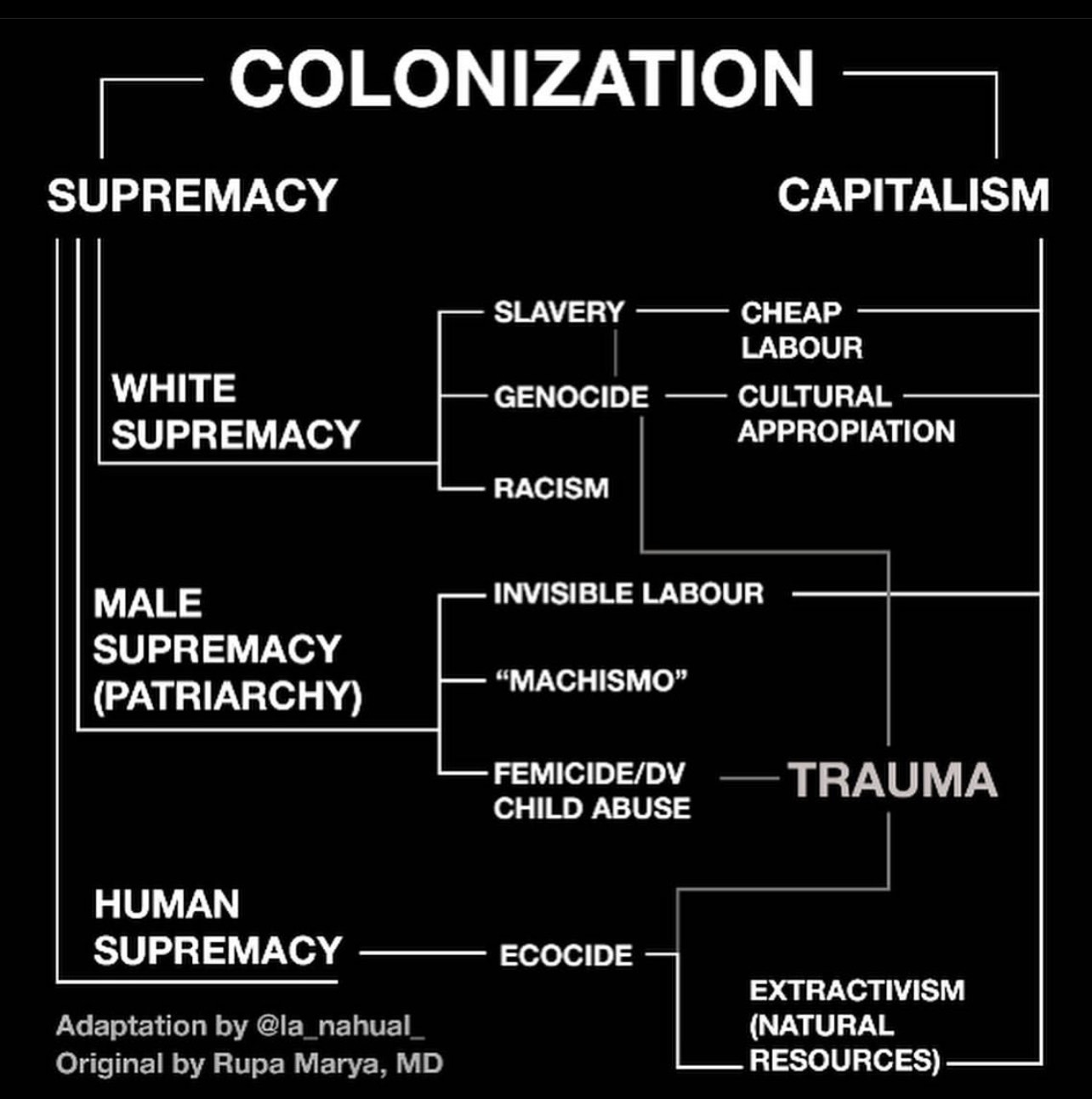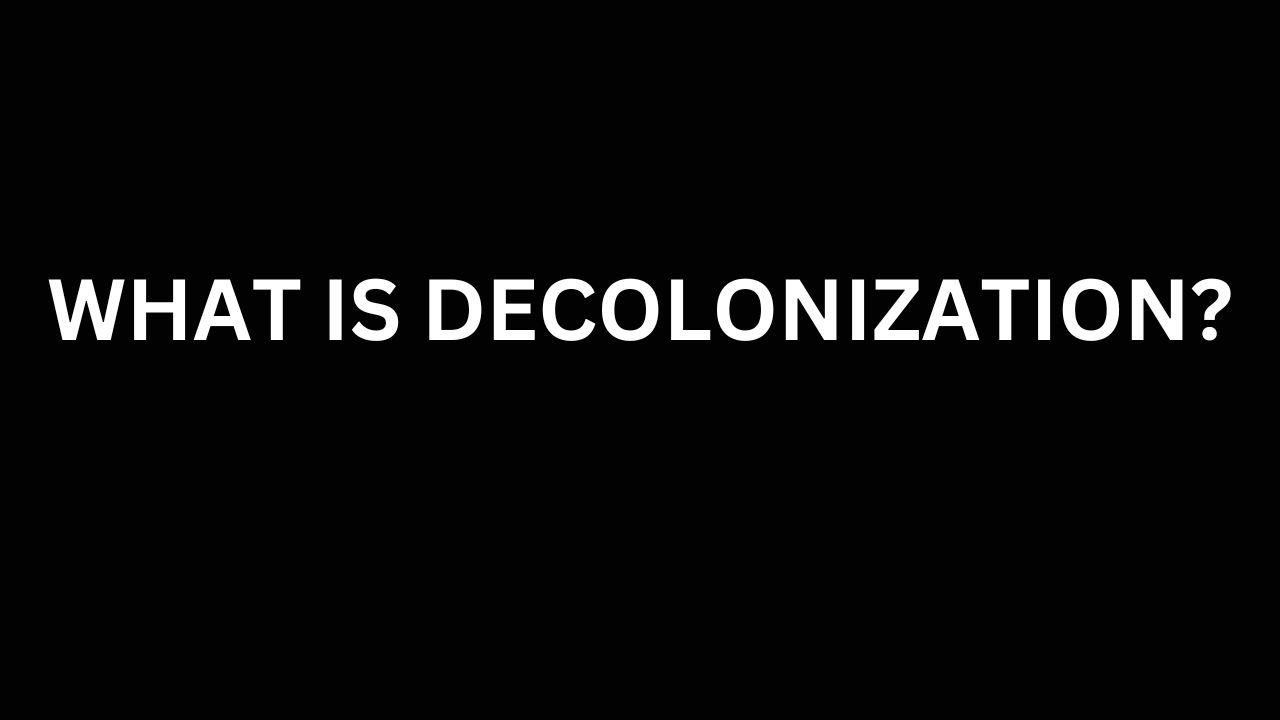On one side, "decolonization is the process of deconstructing colonial ideologies of the superiority and privilege of Western thought and approaches.
Decolonization involves dismantling structures that perpetuate the status quo and addressing unbalanced power dynamics. Also, involves valuing and revitalizing Indigenous knowledge and approaches."
But on the other side and in a more concrete sense, "decolonization is the ending of colonization and the liberation of the colonized. This requires the dismantling of the colonial government and its entire social system upon which control and exploitation are based.

Just as colonialism enters and passes through various phases, so too does decolonization. It would be a mistake to conceive colonization as a single event.
Instead, it is a process that begins with individuals and smalls groups.
The objective is the liberation of land, people and economical products.
The return of the person living in accord with the natural world, living a free, sovereign life. For this reason, one of the main goals in decolonization is disengaging from the colonial system and immerse ourselves in our own culture and history. But to achieve this, the first step is to liberate our mind and spirit.
Liberation of mind and spirit:
The pervasiveness of the colonial system, its ability to penetrate virtually all aspects of our daily lives should not be underestimated. From the moment we are born, the process of socialization begins, which has as its goal the production of obedient workers-slaves.
Throughout childhood and youth, one is exposed to the system's ideology and way of life. This colonial ideology is transmitted through a variety of means, including schools, television, corporate media, movies and pop music. Through these, the way of life and values of the oppressor (individualism, greed, materialism, patriarchy, etc.) are imposed.
Almost everything we are taught or told about society and the world we live comes from a matrix of lies and deception. This is the realization that must be reached for us to even consider the concept of decolonization.
"The first step of getting free is admitting you have a colonized mind. You have to accept that pretty much everything you come to understand about the human experience ( including your choice of making decision whe shopping) was taught to you from a white supremacist, capitalist, patriarchal frame of thinking.
Our goal on enyi on the topic of decolonizing products:
Trade is widely accepted as an important engine of economic growth and development. There are many regions and countries of the world that have been able to lift their peoples from poverty to prosperity through trade. Although the African economy is characterized by a relatively high degree of openness, with the ratio of exports and imports to GDP amounting to 55.7% in 2009, trade has not served as a potent instrument for the achievement of rapid and sustainable economic growth and development for many of the countries. As a consequence, Africa remains the most aid‐dependent continent of the world, unable to eliminate poverty through trade.
That African countries do not trade much with each another has meant that they have been unable to fully harness the synergies and complementarities of their economies and take full advantage of the economies of scale and other benefits (such as income and employment generation) that greater market integration would have provided. There are cases where products and services could have been sourced competitively from other African countries but were procured from outside the continent.
We aim to promote made in Africa products that are not visible in the market due to the unfair conditions in the western world. Enhancing awareness of locally produced and encouraging patronage of African ideas, goods and services.
Infrastructure development is critical for the production of low‐cost and globally competitive goods and services, for the improvement in the performance of African countries in
global trade, and for the expansion of intra‐African trade.
Main objective: Creating regional and continental value chains/complementarity, to increase local production/ trade in goods produced in Africa: With your cooperation and support, we can make this a reality.
Credits
Pulling together: A guide for Indigenization of post-secondary institutions by lan Cull, Robert L.A. Hancock, Stephanie Mckeown, Michelle Pidgeon y Adrienne Vedan.
Colonization and Decolonization, A Manual for Indigenous Liberation in the 21st Century by Zig-Zag





